Planning a trip can be exhilarating and overwhelming at the same time. The recent revolution in artificial intelligence (AI) has led to utilization of more sophisticated tools by travelers when planning trips which provide them with personalized travel itineraries, real time updates and seamless booking. As a frequent traveler, I have taken it upon myself to compare and filtered out the outdated options to provide an in-depth analysis of the top tools & platforms available in 2025.
1. Easytrip.ai
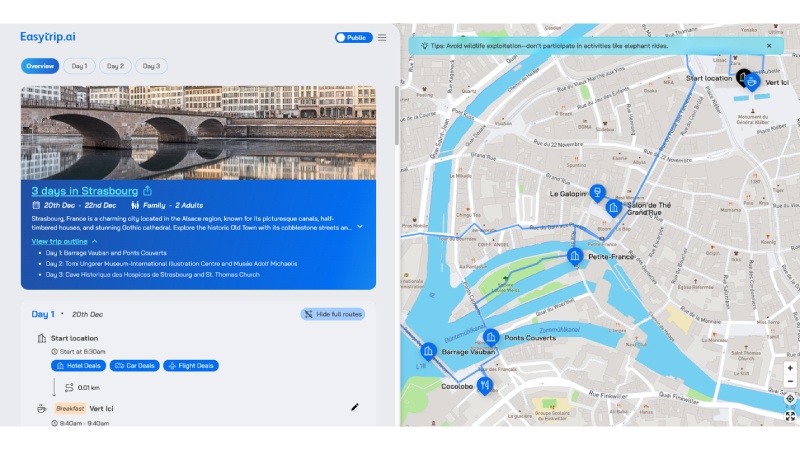
Easytrip.ai has stood out as a frontrunner when it comes to AI Travel Planning, providing an All-in-One free service suitable for newbies as well as experienced tourists. With support from global industry giants and mentions across several Tourism journals, Easytrip.ai has maintained an image of trustworthiness while exceeding customers’ expectations each time. What makes Easytrip.ai stand out from other planners is their excellent user interface combined with top–notch AI, positioning it as a leading choice for ai trip planner.
Pros:
- Uses advanced algorithms to ensure a smart and eco–friendly trip plans tailored to individual preferences.
- Takes into account weather conditions, local events & festivals to avoid missing anything during your trip.
- Partners with all major airlines, hotels, car rentals, activities services with exclusive deals.
- Extremely easy to create and edit trip for everyone with its simple user interface and navigation.
Cons:
- The trip planner is free, but there is no trial for premium features.
- The list of destinations is still limited due to their complicated algorithms. Consequently, some lesser known destinations may not make it to the list.
Pricing:
- Free for up to 4-day itineraries and basic support services.
- Premium Plan with a one-time payment of $40.
2. Layla
(formerly known as Roam Around & Trip Planner AI, now merged to Layla)
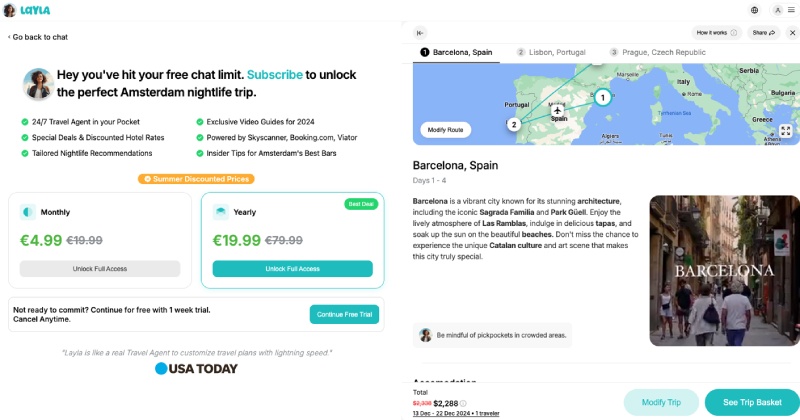
Layla represents the best travel assistant. The merger provided a powerful AI-enabled travel assistant which helps create highly personalized itineraries, optimizes travel routes and offers booking services that match individual taste.
Pros:
- Can effectively answer all your questions concerning the trip and destination.
- Personalized Suggestions- It comes up with destination suggestions that are tailored on your budget, interests or even kind of trip you want for its users.
- User Friendly Design of the chat bot, which anyone would find it easy to interact.
Cons:
- There is no flexibility and users cannot really edit anything. The itineraries created by the assistant must be edited through the assistant.
- Most features require payment through subscription only.
- It may feel overwhelming for new users due to numerous features and booking and tour information provided.
Pricing:
- Subscription $20/year.
3. PlanTrip
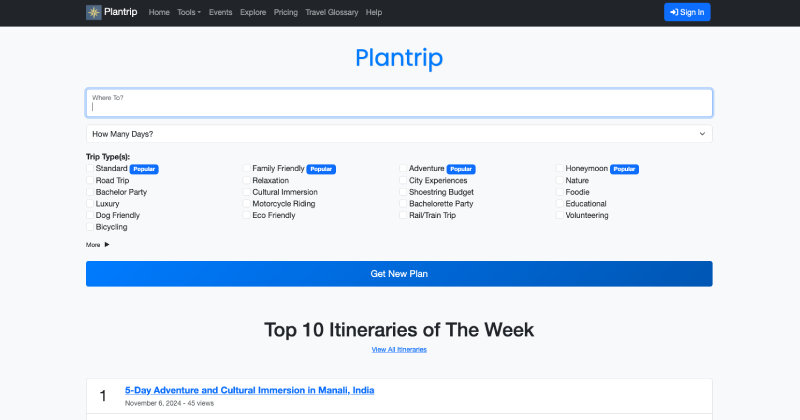
PlanTrip is an AI-driven travel planning tool that lets you create custom travel plans for anywhere on Earth in minutes. Its accessibility across devices has made it possible for people all around the world to plan their trips from anywhere and at any time.
Pros:
- Access your itinerary from any place using any devices.
- Provides genuine off-the-beaten-path activity recommendations with local insights.
- The artificial intelligence constructs and elaborates well-structured itineraries
Cons:
- Basic Customization: Many specific travel preferences cannot be met.
- Subscription Fees- most features are locked behind paywalls
Price:
- Subscription $50/year.
4. WonderPlan
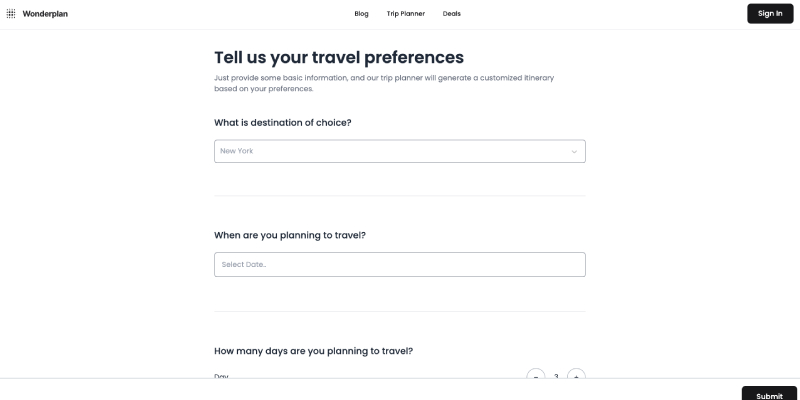
WonderPlan is a dynamic AI-powered platform designed to simplify trip planning by offering personalized itineraries based on individual interests, preferences, and budgets.
Pros:
- Can quickly craft custom travel plans tailored to user preferences, including budget.
- Allows users to easily modify itineraries by adding or reordering destinations.
- Offers the option to download plans as a PDF for accessibility without an internet connection.
Cons:
- Uses outdated data for the itineraries and may not fully capture nuanced, local knowledge
- While personalized, suggestions might feel very generic.
- The quality of the itinerary is quite low, and heavily relies on the user’s ability to edit their trip manually.
Pricing:
- Free
5. GuideGeek
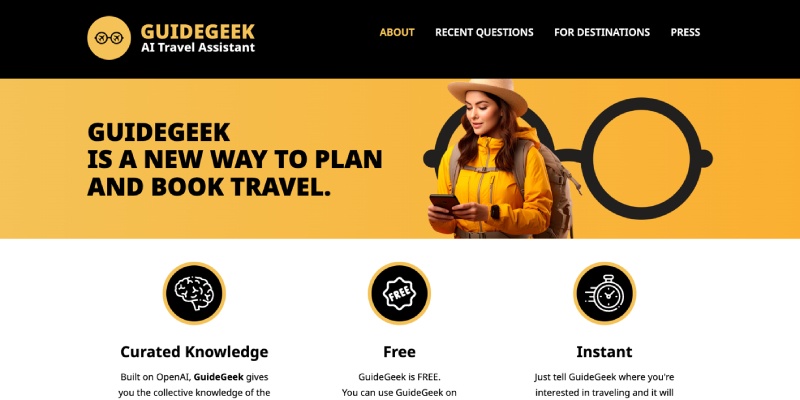
This is a chatbot “app” designed to answer all questions regarding a trip. It communicates through messages applications such as Instagram, WhatsApp as well as Facebook Messenger, giving trip planning ideas using its generative AI technology
Pros:
- Its popularity has ensured that travelers will be able to access it without downloading any application; hence accessing personal messages
- Offers answers depending on someone’s question while traveling
- Gives travel-related replies quickly
Cons:
- Limited features, and primarily focuses on information provision than making a trip plan.
- Communication requires an active internet connection
Price:
- Free
6. Voyagio
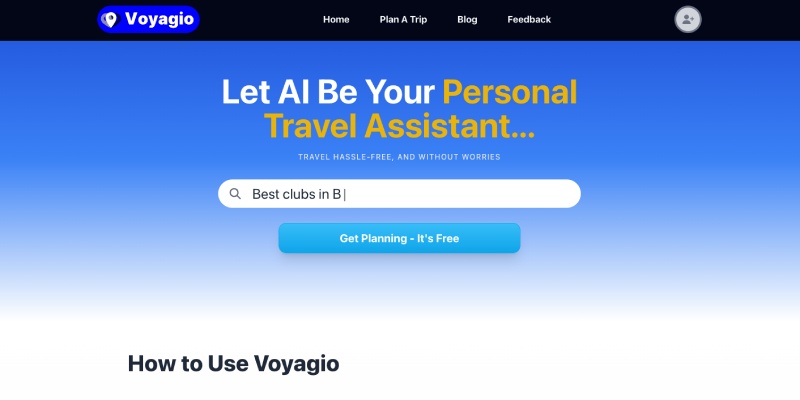
Voyagio is an AI-based itinerary planner that customizes trips with different options, from adventure to relaxation, catering to travelers seeking efficient and personalized trip planning.
Pros:
- Offers several travel styles tailored differently.
- AI makes planning much quicker and efficient.
- Intuitive interface.
Cons:
- Users cannot edit their trip after generation.
- Data is not updated, making the recommendations inaccurate.
- It is impossible to share trips with any social media platforms.
Price:
- Free
AI in Travel Industry: A Look at 2025
According to Statista, the global AI travel market is set to reach $4.5 billion in 2025, growing at a compound annual growth rate (CAGR) of 17% from 2022. With travel demand rocketing post- COVID-19 era, AI has become essential both for tourists and industry players.
Additionally, as per the report shared by Travel Weekly’s survey, 80% of modern travelers prefer platforms using AI for personalisation purposes now.
The Future of AI Travel Planners
We can expect these platforms to become even more sophisticated as AI technology continues to evolve and is far from stagnant. Some of the predictions for 2025 pitch towards:
- Voice First Integration Growing: It is likely that platforms will adopt voice assistants hence simplifying planning through conversation.
- Improved Locality Info: In such situations, tools will offer up-to-the-minute advice surrounding culture or safety at any given moment.
- Augmented Reality: You may soon be able to see your destination and hotel in 360 degrees before you travel.
- Sustainability Integration: AI can focus more on eco-friendly travel options and routes, addressing growing consumer demand for sustainable tourism
- AI internal communication: major platforms like OpenAI Search or Google AI Search are expected to start talking and collaborating with smaller, reliable AI services to show better search results.
The way that we travel and see the world is changing drastically, with the help of AI in travel planning tools. You can choose from comprehensive services like Easytrip.ai or select niche applications such as the travel chat assistant Layla. As someone who frequently travels, I would personally recommend all modern travelers to try out different tools and choose what best for their needs. Whether you are a seasoned traveler or a first-time traveler planning your journey, travel planning with these tools will lift significantly reduce your stress and hassle. The future of travel now. It’s smart, eco-friendly and powered by Artificial intelligence. And remember, no matter where you travel to, leave only your footprint!